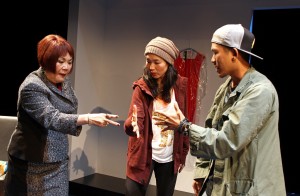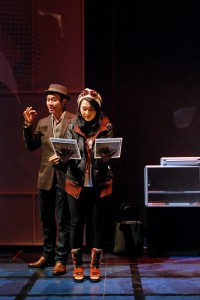
The Kwans are an ambitious bunch. They’re doing well for themselves: Brother “H” is a successful sportswriter, younger brother Francis is a up and coming illusionist in Vegas and L.A., and sister Blue is putting herself through Brown. Dad vacated the scene some time ago, but Mable has done just fine providing for her brood as a single mom. She is, after all, one of the most highly regarded grifters in the country.
That’s right, grifter – as in con artist. And she’s so proud of her expertise she’s reared her kids to be first-rate grifters, too. It’s the family business, as it were.
As “Fast Company” begins, Blue and her brother “H” are about to pull off a particularly lucrative job. He’s made a near-perfect copy of an Action Comic #1 from 1938, valued at over a million bucks. The “mark” will examine an authentic copy (temporarily “borrowed” for the occasion) nd pay his money, but at the last instant the grifters will substitute the fake.
But then “H” runs off with the original. Trouble. Blue’s other brother Francis offers to help get the comic back. But “H” is slippery. They decide they need help from a true master – their mother Mable. But wait, more trouble. There’s a very valuable comic book floating around, the Kwans are not noted for their family loyalty. Can they be trusted not to grift each other?
Such is the funny premise of Carla Ching’s flawed, smart, promising new play having its World Premiere at South Coast Repertory through October 27.
If “Fast Company” was a film (and there are indications that both Ching and director Bart DeLorenzo wish, perhaps subconsciously, that it were – his incessant use of an

irritating video “title sequence” is a giveaway on his part), it would be a caper flik.
But we’re not in a cinema and Ching’s story, as it is currently imagined, doesn’t feel altogether at home in a theater. The scenes feel, paradoxically, progressively stagey and overwritten. Characters talk about grifting. We crave to see them actually do it, but rarely get the chance.
Interwoven amidst her knockabout crime comedy, Ching also wants to examine the nooks and subtleties of a clearly – one might say wildly — dysfunctional family. It’s a worthy ambition, but there one too many spinning plates here. Both aspects of her play feel undernourished.
We look forward, quite naturally, to discovering why Mable has chosen to raise her three kids for a life of crime. The answer, when it comes, (it has to do with a disappearing husband) is feeble and dramatically cliched.
And how are we supposed to feel about the moral emptiness of the grifter’s life? The Kwans seem, at best (worst?) vaguely uneasy about it. Ching doesn’t grant them the gleeful purity of the Addams’ Family, say, but neither does she compare them to the tortured Tyrones of Long Day’s Journey Into Night.
Which is not to say the Kwans are not good company. They are. We just wish “Fast Company” let us get to know them a bit better.
For more information, visit www.SCR.org.




